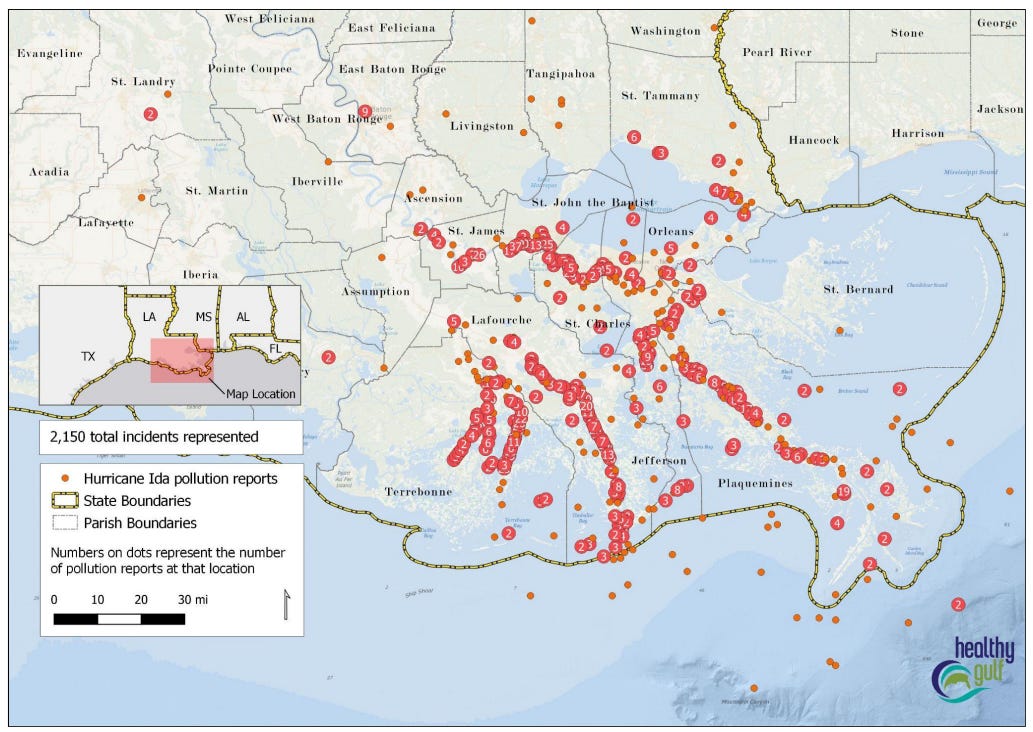Report: More Than 2,200 Oil, Gas, and Chemical Pollution Incidents Following Hurricane Ida
The area of oil spills and sheens alone could cover an area the size of Metairie

A new report from Health Gulf, a New Orleans-based nonprofit organization serving communities across the Gulf Coast, reveals the extent of environmental damage across Southeast Louisiana is far greater than initially reported in the wake of Hurricane Ida.
Following the August 29, 2021 landfall of the Category 4 hurricane, data now shows there were 2,230 pollution events that could be directly or indirectly attributed to the storm. Among those were:
171 oil spills totally 229,633 gallons cumulatively
257 reports of oil sheens or spills, 22 of which add up to cover an area over 25 square miles - roughly the size of Metairie
48 air pollution reports with over 1 million pounds of harmful pollutants emitted
But as alarming as those numbers are, they’re likely to be an undercount of what was actually released, the organization says. That’s because of the 2,230 reported incidents, only 150 of those reports included specific pollution or spill amounts.

“Pollution events following storms do not occur in a vacuum,” says Naomi Yoder, staff scientist for Healthy Gulf. “In fact, they are almost entirely predictable after the pattern is repeated year after year, storm after storm, spill after spill.”
Louisiana is home to a thriving petrochemical industry that includes 10 of the largest generators of airborne toxicity in the country. These so-called “super-polluters” are responsible for harmful emissions year-round but can be particularly dangerous during hurricanes, which can damage the plants and result in unplanned emissions.
According to a previous report, eleven “Toxic 100” facilities reside in the area along the Mississippi River between Baton Rouge and New Orleans widely known as “Cancer Alley.” This is the area that was most directly affected by Hurricane Ida.
“For Hurricane Ida, similar to Hurricanes Delta, Laura, Rita, and Katrina, climate injustice and environmental injustice collide and compound, through the spillage of massive amounts of pollution in the air, soil, and water,” Yoder said. “Pollution is already a significant concern for human and ecological health on its own, but, combined with these other demographic factors, the situation starts to resemble intentional “sacrifice zones” where people and ecosystems are discarded or regarded as lesser than others.”
In March of 2021 - just five months before Hurricane Ida’s landfall - human rights experts from the United Nations called on President Biden and the Environmental Protection Agency to put an end to the environmental racism that has been at play in the area for decades.
“This form of environmental racism poses serious and disproportionate threats to the enjoyment of several human rights of its largely African American residents, including the right to equality and non-discrimination, the right to life, the right to health, right to an adequate standard of living and cultural rights”, the experts said.
According to the Healthy Gulf post-Ida report, Louisiana’s communities can’t continue to bear the burden - both personally and financially - of these repeated environmental disasters.
“Gulf Coast communities and ecosystems can’t afford to continue the old ways of using and processing fossil fuels,” the report’s executive summary states.
“The fossil fuel industry has an imperative to commit to this transition process, and also must focus on prevention of future spills and toxic disasters. Fossil fuel facilities should conduct every prevention measure available, until a “Just Transition” to renewable energy has successfully occurred. Fossil fuel facilities must also shoulder the cost burden of implementing prevention measures, as well as disposing safely of waste and decommissioning facilities properly.”
In addition to holding fossil fuel facilities responsible for the pollution they create both during regular operation and during disastrous weather events, Healthy Gulf calls on environmental regulators to take a more active role in holding polluters accountable. They call for a data standard across reporting agencies along with a centralized, publicly accessible database for incident reports following a hurricane or other disaster.
“Human rights and rights of nature are non-negotiable,” Yoder said. “No people or ecosystems deserve to be treated as a sacrifice zone, much less people that have been marginalized for years, decades, and even centuries.”
Support Local, Independent Journalism
ReportNOLA is the sole creation of Jennsen Bentley - a local, independent journalist who is dedicated to serving the community of New Orleans. As a proud member of the Society of Professional Journalists, he is dedicated to ethical reporting on issues that matter.



